All images courtesy of Atomic Fire Records
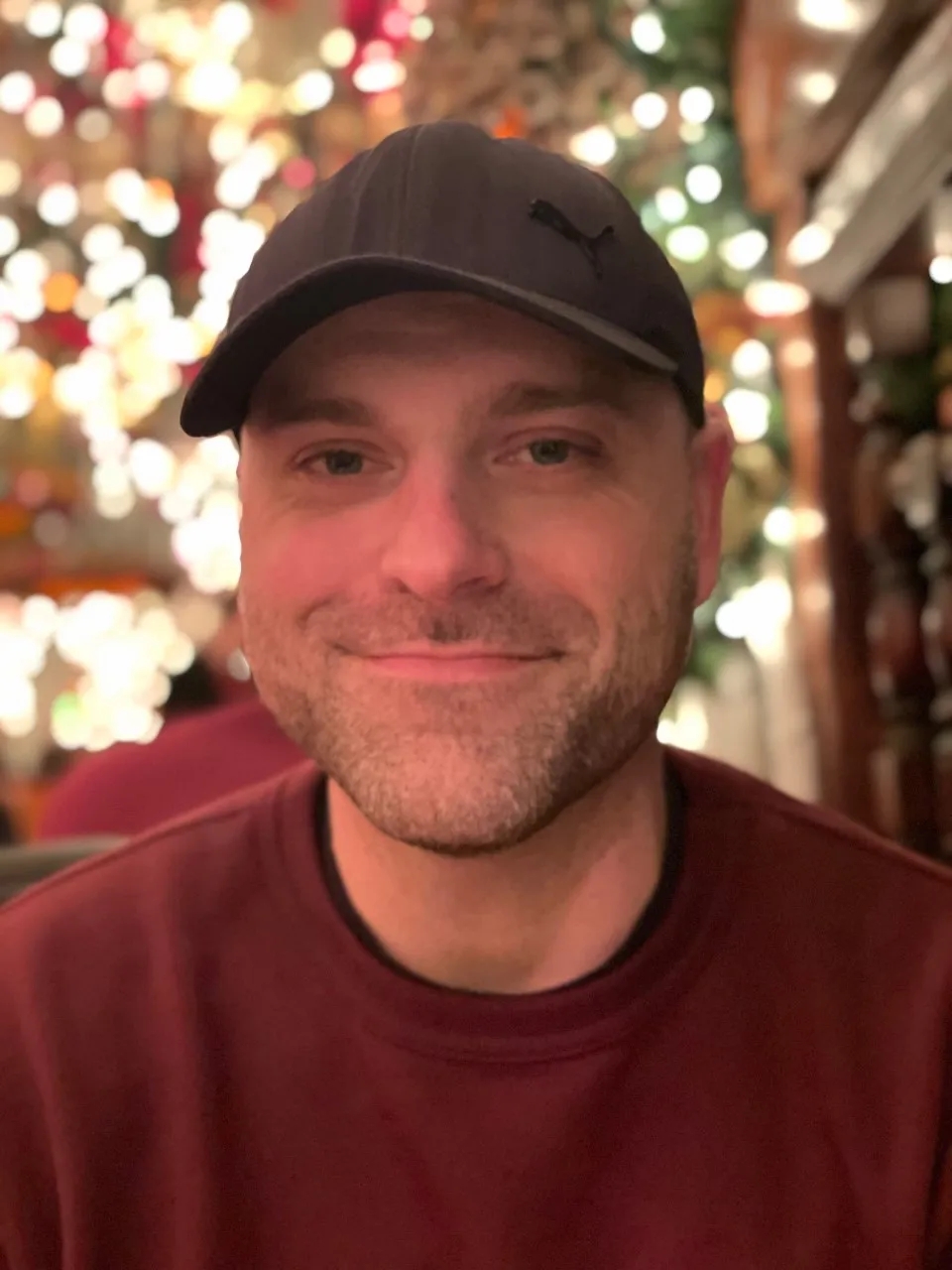
By Andrew Daly
andrew@vinylwriter.com
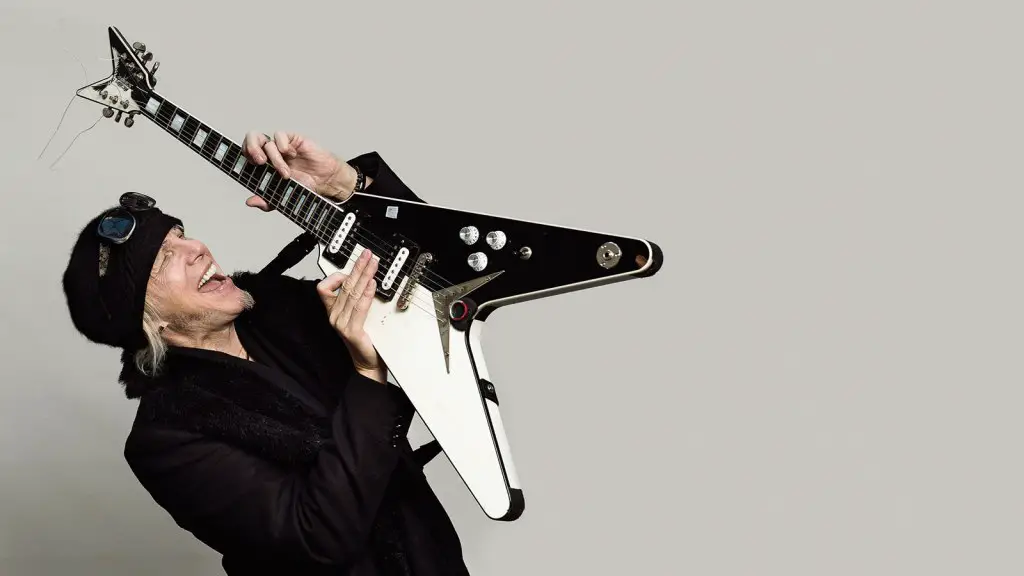
Flying V strapped across his chest, blonde-haired, and leather-clad, Michael Schenker has influenced generations of guitar players worldwide over the course of a now fifty-years-strong career.
Hitting the ground running in 1972, Schenker aided in defining the sound of eventual superstar German outfit, Scorpions, before giving in to his nomadic ways, and signing on with then wayward act UFO in 1974.
To say Schenker’s impact was immediate would be an understatement and by the end of the 70s, with UFO’s catalog of soon-to-be-classic albums in his wake, Schenker slung his guitar over his shoulder and allowed himself to roam free once again, eventually forming the Michael Schenker Group in late 1979.
In the years since, through many twists and turns, Schenker has consistently released music year in, and year out, his influence and relevance burning ever-bright, igniting stages across the globe, caressing the ears of those who listen with notes of unladen fire and guitar-driven majesty
While on tour in the U.K., Schenker took the time to speak with me via phone regarding his ongoing tour, his memories of the Scorpions Lonesome Crow fifty years on, his impact on UFO, nearly joining Deep Purple, and a whole lot more.
Andrew:
Michael, thanks for taking some time with me today. Let’s dive into the tour. How have the shows and audience reception been thus far?
Michael:
Well, I haven’t played the new album in full yet in concert. I have only played the songs we just did in Europe, and those went down really well. We had many happy fans singing along and so on. The atmosphere was great, and in general, the album is going down really well with reviewers. I can say that the two songs that we played live, “Emergency,” and “A King Has Gone,” went down fantastic.
Andrew:
All signs point to your current band experiencing great chemistry on stage, Michael. What can you say about your bandmates, specifically Ronnie Romero? What makes him a great fit for your music?
Michael”
Well, for one, we picked him, and he’s up there for a reason – he’s really great. I need a talented and versatile singer, and I’m aware of that. What that means is that I need a singer that can cover my past, the many different lineups, and the many different singers, and Ronnie does that. You know, he’s very young, but Ronnie is also very professional. He has a great voice, and when he helped us out with Revelation, that was sort of the first test, and that’s when I became aware of him. After that, I basically said, “Great job. You did a great job with this album, you can sing all my past stuff, you can do the vibrato – you’re hired.” [Laughs]. He’s also an underrated songwriter, and he can write a lot of great stuff too.
Andrew:
What songs from Universal are you most looking forward to playing live, and why?
Michael:
Well, we have “Emergency,” which is a great song. It’s very entertaining musically and has an odd timing, but it’s still very catchy. “A King Has Gone” is just a great song period. It’s a really great song, and I am enjoying playing that one live too. For now, we are just doing those two. We have a bunch of European shows, and we are playing Hellfest, but we have limited time, so I have to be very careful with what I play. For those shows, we just reduce it to one song, but when we have more time, we will bump it up to about three new songs. Normally, when I have the time, I will do at least a two-hour show. I mean, if I wanted to, I could easily play three hours, or even five. [Laughs]. But, I try and restrain myself, be mindful of the setlist, and just keep it at two hours for normal shows. I can’t go overboard, it’ll be too much, so I have to be thoughtful with the setlist, and combine the new songs with the old ones that people want to hear, and that I love playing.
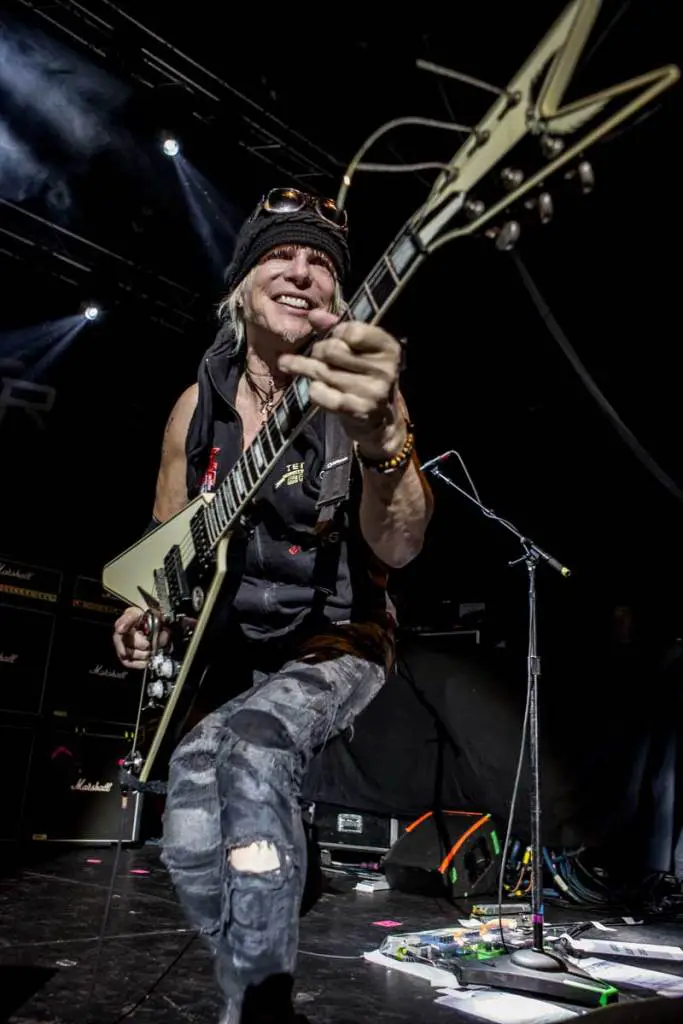
Andrew:
What do you love most about playing live compared to when you’re in the studio?
Michael:
Well, when you play live, you have the feedback from the audience, and you have to repeat your phrasing. It’s the atmosphere that these hardcore fans bring, that says it all. When the fans are really into it, that’s just fantastic. There is a downside though, and that can be playing at different smaller places. Of course, if we play big places, there’s a better sound on stage because the sound can escape, and it’s easier to find the sweet spot. I prefer playing in bigger places and on bigger stages for that reason. The smaller places have all these different things in them like mirrors, metalwork, or concrete pillars, and that all makes a difference in the sound. Sometimes it can be really hard on stage in smaller places, with an unpredictable structure, you really have to have a good sound on stage to enjoy it at that level. If you have a good sound guy, then you can compensate for that, and the audience will love it. It’s funny because, on stage, it can be torture, and I’ll often say, “Wow, what a shitty gig,” and then people who were in the audience go, “Wow, it was amazing!” So what I’m experiencing on stage, sometimes it’s the complete opposite of what the people out there hear.
Andrew;
A common observation seems to be that European audiences, in particular, are more passionate when it comes to metal than US audiences. Where do you stand in regards to that, Michael?
Michael:
I have to tell you, I don’t agree. To me, it’s worldwide. It different everywhere you go, but metal is worldwide. Sometimes the audience is fantastic, and sometimes not. It depends where you’re playing because America is a big place. You might get a totally different reception in New Mexico compared to Texas. When I go to Chicago, the energy is great, and the West Coast is always great. Sometimes in the countryside, it can be mixed, or not so good, but not always. It’s the same in Europe, but Europe is not as big as America, and then you have Spain, and all these different types of places, and cultures. Everywhere you go, some people are looser, and others are less loose, maybe more boring. Even in Japan, it’s always mixed. It doesn’t matter where you go, because anywhere you go, depending on who lives there, it can be great, or not so great. I usually know what to expect going in because I’ve played these places many times.
Andrew:
I wanted to go back a little bit and talk history. As you probably are aware, this year marks the 50th anniversary of the Scorpions Lonesome Crow. What do you remember about the recording of that album in particular?
Michael:
It was my first recording, and it was the first Scorpions album too. I was fifteen years old when we recorded that album, and “In Search of the Peace of Mind” was the first song I had ever written. I remember that particular solo came out of nowhere, and I still really love that solo to this day. For the rest of the album, you can hear I’m developing and had not yet found my full sound yet, but it was still very fun for me at that age. It was my first time in the studio, and it was amazing to hear what we had done later on. I still remember when the album was recorded, and pressed, and I actually had the physical album in my hands and heard it coming through the radio, it was really something to experience that. I could envision myself recording it just a few weeks earlier, I remembered where I was, and that experience is one I’ll never forget.
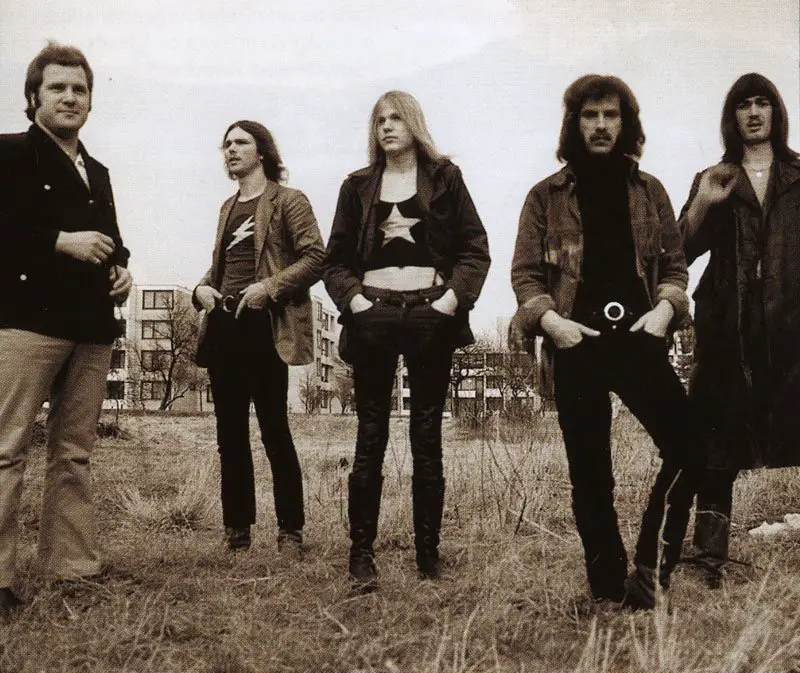
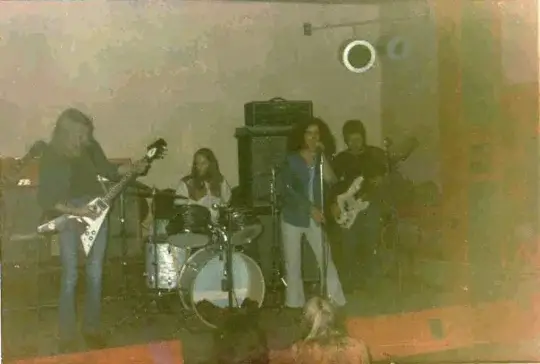
Andrew:
How would you best describe your impact on the Scorpions? Especially since you were so young.
Michael:
Well, I was always focused on the music first, so even at a young age, I brought focus. I thought the drummer Wolfgang Dziony and bass player Lothar Heimberg were absolutely amazing for German musicians. With what we had to work with in Germany, they were really good. I actually really liked the drums and the bass and of course, Klaus Meine’s singing, I liked that too. In general, it was a great sample, but the problem was that everything was going too slow for me. Rudolph [Schenker] could hardly play guitar, and that really brought us down during the sessions, and with that album, even though I was fifteen, and had to do everything with the guitars. I had to be very patient, and I tried to teach Rudolph, but it was slow-moving, and he wasn’t getting it. I had to move on because I wanted to go somewhere where people understood, knew what I was doing, and where it all came from. That’s why I went to England, and once I went there, and I joined UFO, it all went very fast and was non-stop. We had lots of company, we had the audience, and we had the people who loved the music, everything was happening in London, and we started touring straight away. So, England was the place where I didn’t have to hold anyone’s hand, and everything was developing to my liking.
Andrew:
Forty years ago, you put out One Night at Budokan. How would you compare that album to UFO’s Strangers in the Night?
Michael:
They’re both great live albums. Strangers in the Night is definitely a great album because its songs come from the Phenomenon, No Heavy Petting, Lights Out, Force It, and Obsession albums. Everything up until that point in my career was captured on that album, so that was fantastic. And then, of course, One Night at Budokan, that was Peter Mensch’s brainchild. Around that time, things were pretty hectic because we actually mixing the second studio album, and suddenly Peter was sending us to Japan to record the live album. I think the live album was actually released before the second studio album or something like that, so it was kind of a bit mixed up. And then, Peter got fired halfway through mixing the live album, because he had an issue with the drums, and Cozy Powell didn’t like that. So I ended up mixing the album with two engineers, David Wooley and David Kirkwood, and luckily the engineers had everything set up correctly, and to our specifications. It was a weird time, because Peter had us all over the place, and everything was happening all at once, but that album came out great too. I love them both equally for different reasons.
Andrew:
This was also around the time that David Coverdale asked you to join Whitesnake, right?
Michael:
Yes. It was a crazy time. In the middle of getting the live album, and the second album done, David Coverdale asked me to join his band. Peter came to me one day and said, “Michael, David Coverdale wants you to be a part of Whitesnake.” So, I called David, and I said, “No, why don’t you come and join the Michael Schenker Group instead?” Well, David did not want to be part of Michael Shenker Group, and he was upset that I did not want to join Whitesnake. So, suddenly, I look up, and Cozy Powell has left my band, and had joined David Coverdale in Whitesnake. This was after Bernie Marsden had left, and before John Sykes had joined. The way it all happened was I was jamming with David at my house one day, because he had come over, and was hanging out. I started playing what would become “Searching for a Reason,” which would end up on Assault Attack, and David started singing some words – none of which ended up on Assault Attack – and it went from there. You know, we were just jamming, he was singing, and we did that until the sun came up. After that, David asked me to join Whitesnake, and I declined, which I guess he did not like. It was all very messy, but the outcomes were good for all of us eventually.

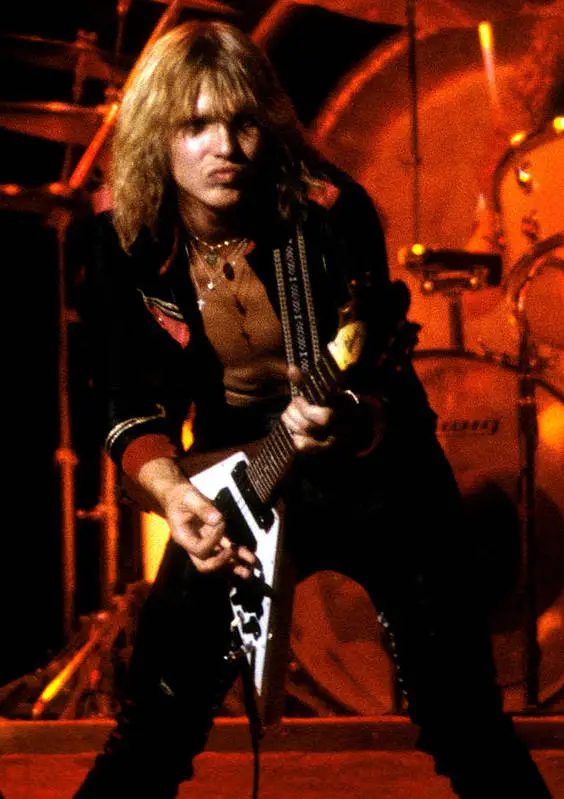
Andrew:
The last time we spoke, you mentioned that when you joined UFO, you turned them into a rock band. With that in mind, how would you measure your influence over UFO?
Michael:
Oh, big time. I mean, they were doing a completely different style of music when I joined them. Well, when I came on, all of that was out the window. They did have success early on in Germany, and so on with the other styles, but it was more psychedelic rock, I guess. When we teamed up together, I was basically the musical leader, and I was coming up with all these ideas. And then, of course, Pete Way had great ideas, because he was more rock-oriented, and putting his dirty style together with my melodic style made for great chemistry. With UFO, in those days, after I had joined, it didn’t really matter who was producing, it would just always come out incredible, and it was the same when we reunited all those years later. Musically, it just came right back. Before I was there though, UFO had a very immature sound, a kind of hillbilly sound, and it all needed to be adjusted. Once I got there, we were very focused, very heavy, and very concentrated. I injected a whole new type of vibe, musically. I was very musically very focused, I couldn’t mess around, and I couldn’t speak any English, therefore I let the music do the talking, and that was a good thing. I turned UFO into a guitar band, and after I got there, nothing was ever the same again for them.
Andrew:
I saw an interesting quote recently where you mentioned that you feel that you had a great deal of influence on K.K. Downing, so much so, that he imitated you. Can you expand on that at all?
Michael:
According to the reports I’m getting – and I’m not searching for it – apparently, my influence over him was overwhelming. I mean, my girlfriend, and I went to see him when I was around nineteen years old. We had come to see Judas Priest at the Whiskey A Go Go, and she looked at me, I looked at her, and we couldn’t believe what we were seeing. You know, K.K., he had the same blonde hairstyle as me, the long black boots, and all the rest. I will say that it could not have been a coincidence, I mean, K.K. had the Flying V guitar, the curly hair, everything. Look, he was a fan, and there was no point in denying it. The fact is, there were so many people – all these guys – who wanted what I had, and I didn’t even know what I had. [Laughs]. But apparently, they all wondered what I had, and they were searching for it through imitation. To me, it was just the perspective of the guys, they thought if they had what I had, they would probably get all the girls, but I wasn’t doing anything on purpose, and I was never doing any of it to get girls. [Laughs]. I was just being myself as a musician through self-expression.
Andrew:
What are a couple of releases that you’ve put out over the years that you feel are most overlooked?
Michael:
I don’t look at things that way, so I don’t know what is overlooked. I don’t try and rank my releases or anything, I was just inspired to make a record, so I did. In my career, I’ve always just recorded the record, put it out, and let it go into the machine. During the time I was making them, I was almost on a different planet. I was out in orbit, nobody had contact with me, and I had no contact with others. It was just the music that me and my friends were making at the time. There was so much stuff that I wanted to do, that I had to desire to do, where I wanted to be free, but I could never do it. I’ve wanted to self-express and I’ve never cared who was buying the album or not. I’m an artist, and I’ve just always needed to get stuff out of my system and to do all of these crazy things that I couldn’t have done with the Scorpions or any of the other people who asked me to join them. I needed to get things out of my system that would have not been suitable for Ozzy [Osbourne] or Deep Purple, or anybody else who was stuck in the commercial end of the spectrum.

Andrew:
To that end, for yourself personally, Michael, which album are you most proud of then?
Michael:
Well, first of all, I’m not proud. I don’t like the word proud. I’m happy with things, but I cannot tell anything beyond that, because my whole musical career is an ongoing development. How can we compare things as we get older and more developed? We have different circumstances, our surroundings are different, and every year something changes. So we cannot compare, or say what is better or what’s not better because when I grew up as a developing musician, and as a guitarist, every development was a highlight. For every release of an album, I had done some stuff guitar playing-wise that I hadn’t done before. I kept going, and then I found out that people were copying my style, so, to stop that, I kept self-expressing. I kept expressing new stuff, and I was always a step ahead while people were still copying my old style. And while they were doing that, I was already developing new stuff, and getting things out of my system. I’ve always been excited about what’s next, and after I get a result, I move on to the next thing. And so for me, it’s not best or worse, I was never doing it for that reason.
Andrew:
You mentioned Deep Purple, so I wanted to hit on that. How close were you to joining them?
Michael:
Well, it was very close. It was around 1993, and a lot of stuff happened in ’93. I was touring with the Scorpions to try and help them to sell tickets in Japan and in Europe. At the same time, the UFO guys called me up and asked me to join them for a tour too. It was around this time that Deep Purple called me, and they also asked me to join. It was all in the same two months. It was so hectic that I didn’t know if I was coming or going. So, I ended up declining Deep Purple when I was approached, and the way I did that is I just said nothing. Instead, I kept quiet, because this is when I was on tour with the Scorpions. I asked the guys in the band, “What would you do if you were me? Would you carry on with UFO, or join Deep Purple?”In the end, it was clear why I should not join Deep Purple, and it was for the same reason I declined to join Ozzy, and all the other bands, because I did not want to want to copy other people. If I would have joined Deep Purple, even though they were one of my favorite bands, I would have had to play like Ritchie Blackmore, and I never would have wanted to do that. All the guys in the Scorpions agreed, and that’s why I joined UFO again instead.

Andrew:
Are you still in touch with your old bandmates in the Scorpions and UFO?
Michael:
I don’t trust Rudolph, and for that reason, I’m staying very far away from them. People get stuck on nostalgia, and say I made all this great music with the Scorpions – I only played on Lonesome Crow, and then helped then on Lovedrive, which was too pop 80s sounding to me anyway. The music I made with them is alright, but the point is Rudolph is a bully and I don’t trust him. Rudolph is a scary guy, and I don’t want to be around him. That’s just the way it is, so to the fans, that’s it, I’m sorry.
As for the UFO guys, I guess it’s kind of obvious there too. You know, Paul Raymond is gone, and Pete Way is gone, so there is Andy Parker left as far as I’m concerned. I mean, Phil Mogg lives only like a couple of miles away from me, but I haven’t bumped into him in a while. The last time I saw Phil was when I heard that Paul Raymond died. I actually saw him walking down the road, and I jumped out of the car, and I hugged him. I said, “Paul, I am so sad about Paul. I am sorry,” and he just said a few words back, and that was it.
Andrew:
Last one. What’s next for you moving forward, Michael?
Michael:
We are doing Hellfest at the of June, so that’s the big one coming up. In August, and July, we do some shows in the U.K., and then in Sweden, and then some more festivals. We go to America in September, October, and November. After that, we go to Japan, and then we will probably have more shows booked for Europe, and we might go to South America and Australia too. It all depends on the offers we get because they have been coming in since the album has been released. Once we get through all of that, there’s a chance I may just right back into the studio, and follow Universal up right away. We will see how it goes, but I hope to see you all there.

– Andrew Daly (@vwmusicrocks) is the Editor-in-Chief for www.vwmusicrocks.com and may be reached at andrew@vinylwriter.com
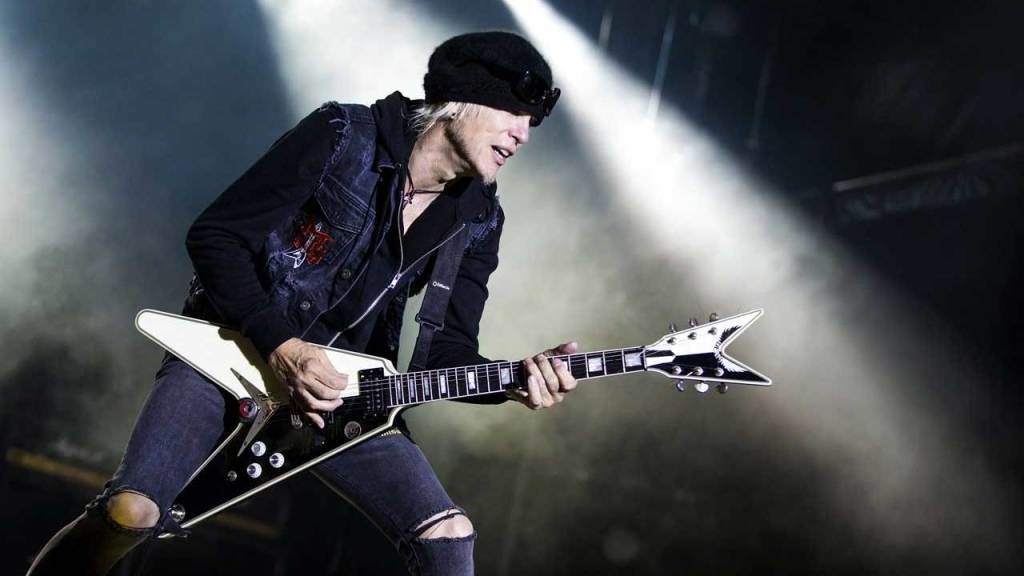




Leave a Reply